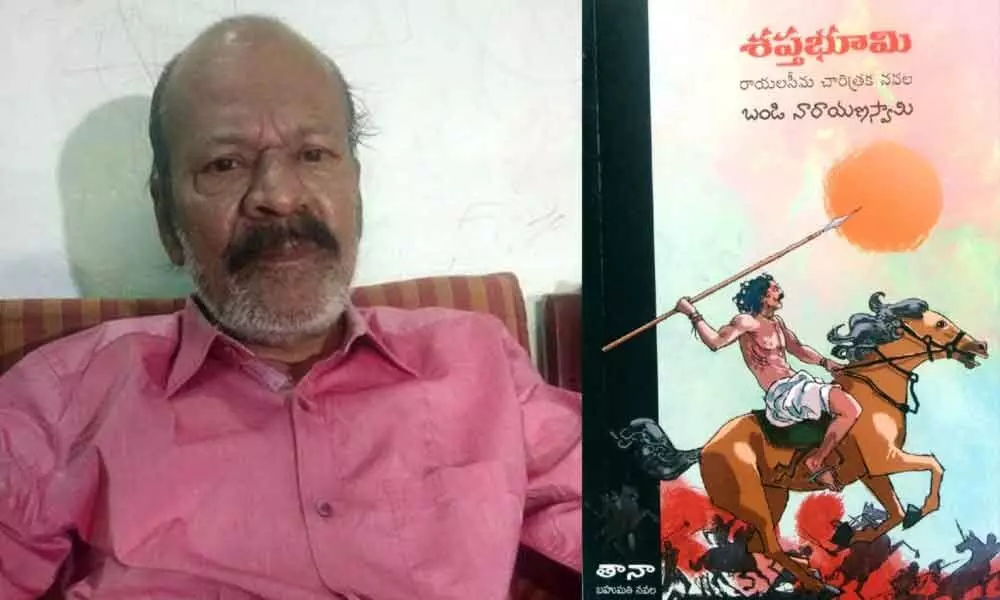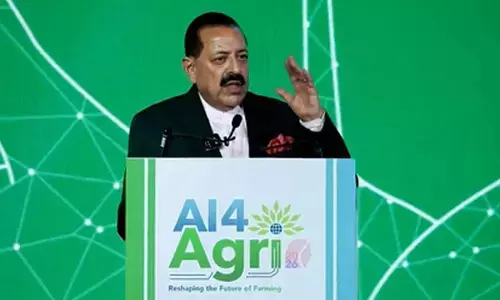Oppression in the cursed land

History is not merely the story of Kings and Queens who ruled different regions. It is also a chronicle of the misery and tears of oppressed subjects whose existence hinged on their powers of survival.
History is not merely the story of Kings and Queens who ruled different regions. It is also a chronicle of the misery and tears of oppressed subjects whose existence hinged on their powers of survival. The focus on suppressed and weaker sections of society that unwittingly crept into his writing makes his historical fiction a bridge between the past and the present where oppression continues in a changed form says Bandi Narayana Swamy, winner of the 2019 Central Sahitya Akademi award for his much-acclaimed novel 'Shaptabhoomi' (Cursed land).
The idea for this novel came to him some eight years ago but finally took shape after one year spent on researching the history of Rayalaseema in the 18th century and another writing it, says the 66-year-old writer who hails from Anantapur in Rayalaseema. The Mackenzie documents and historical records of 200 years of the Rayalaseema rule under the Hande kings gave him an in-depth understanding of the socio-political milieu, the economics, culture, tradition, and the bloody feuds among Palegars who dominated social discourse during that period.. "I used several real life characters like Siddramappa Naidu, a minister called Karihalli Basavanna, William Brown of the East India Company and others but created fictional characters to recreate real incidents of the time.
It was a challenge writing the novel as there was no model to emulate unlike historical characters like say Krishnadevaraya or Jhansi Lakshmi Bai on whom there is a lot of written work. My focus however was on the Malas, the Madigas, the Kuruvas and other oppressed castes and I traversed between fact and fiction to portray their lives and times" says Narayanaswamy. The drought conditions in Rayalaseema continue to this day, the violence of the past continues as factionism and the cruel 'Amaranayakas' of the past have been replaced by landowners of the present, he cites speaking of conditions in Rayalaeema which are unchanged to this day merely changing form.
Instances of 'Sati '(where a woman immolated herself at the funeral pyre of her husband) were real in those times and to bring out this evil tradition the author created a fictional character called Chinnaredamma. The 'Veeramandapam ' (seen In Srisailam) where the people who had enormous respect for the King prayed for his well being and victory offering human sacrifice was real. The bizarre practice of a man's body being cut into 8 parts and offered to Lord Shiva was presented through the fictional character of Bille Yellappa elaborates Narayana Swamy who presented an accurate picture of the times from the lens of the weak and downtrodden Dalits and Bhaujans. The humble author says he was clueless about the merit of his work or how to apply for the award and that it was more a demand from his readers than his own. Although awards are certainly welcome the satisfaction derived from creating a literary work is incomparable he admits.
Born into a poor farmer's family and having worked as a primary school teacher in his village for 28 years, he knew the travails of farmers, the plight of the lower castes due to the discrimination meted out by the higher castes, the drought and poverty and the extreme violence witnessed here.' I was born in a poor lower caste (shudra) household where there was no fragrance of education. My father could barely read and my mother was illiterate. It is society that moulded me into a writer" Swamy says. His love for reading in childhood was inspired by his friendship with Dakshinamurthi who belonged to a Tamil Brahmin family and whose household abounded with books and magazines. The discussion in the family pertained to books, classics like Cleopatra, Kannagi and works of Satyajit Ray.
There was a violin on the wall and all discussions related to music, literature and culture. "The Bapanamma ( Brahmin lady) used to gave me coffee and snacks and a copy of the weekly magazine when I visited their home every Monday knowing full well the reason for my visit. My association with this family fuelled my love for reading. I also used to visit the district Library from where I quietly stole books to read them later at home' Narayana Swamy laughs. "Gaddalaaduthundai", "Mee Rajyam meerelandi" and 'Rendu Kalala Dessam ' are three other novels written by him which are all centred around Dalits.
Coming back to the title of his book, he says it remains relevant through the ages. Drought made living conditions miserable for its people while rulers and politicians alike showed scant regard for people's sentiments. The Nizam ceded these districts to the British who developed coastal Andhra Pradesh and other areas by constructing dams and Barrages while Rayalaseema was left out of development he avers. Subsequent betrayals at different times resulted in Rayalaseema's demand for a separate state falling on deaf years. "What else would you call this land but cursed, when you see constant drought, 3 or 4 farmer suicide every month and faction deaths"? he asks. Happy in his space, he knows not what he will write next. He only knows that it is observation and response to the environment around him that inspires him. One just has to wait for his next inspiration.
- Aruna Ravikumar








